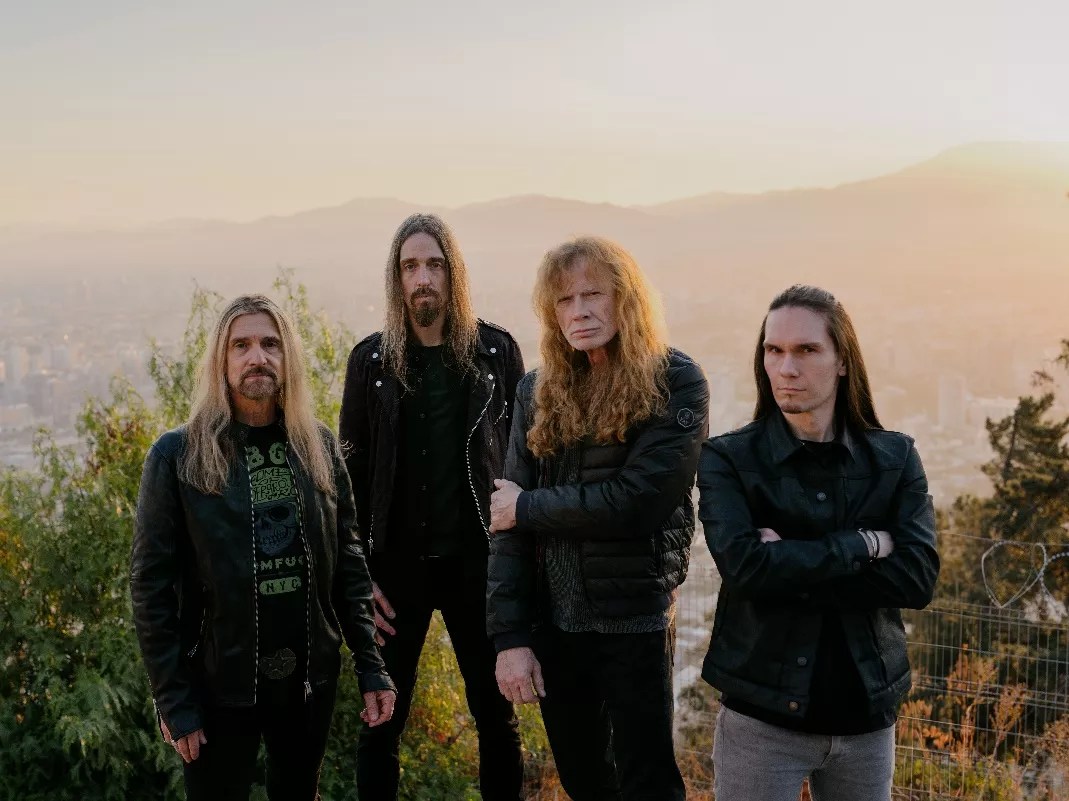
Travis Shinn

Audio By Carbonatix
The beauty of rock ‘n’ roll music is that it rarely demands to be understood. If you spend a lot of time trying to dissect it or figure it out, you’ll end up missing the real point and that is this: Rock ‘n’ roll music begs you to feel. Sometimes it’s way more fun and feels better to let your emotions enjoy the ride than to attempt to figure it out.
People (including your humble storyteller here) often try, though, to attach all kinds of meaning to songs. We strive to understand the artists, too, and we’re often dead wrong about who they are as people. Even the biggest rock stars have real lives to live and, a lot of the time, have real problems, fears and feelings they’re trying to sort out just like you and me.
It’s really fun when you get a glimpse of the person, even if you ultimately prefer to bang your head and rock out to their tunes.
On Megadeth’s most recent record, “The Sick, The Dying … And The Dead!” Dave Mustaine of Megadeth has a song called “Life In Hell.” Upon first listen, it seems like a pretty straightforward treatment of modern life and the struggles of an addict, but it goes much deeper.
During a recent conversation, Mustaine, now 62 years old, looked up the lyrics after I asked him about the song and gave me the kind of detailed answer I wasn’t expecting prior to our conversation. I had thought he might just give me some lip service and I was wrong.
“It’s about somebody who got caught doing something very bad. Caught red-handed. The guy is cheating. He’s got this mentality that it’s okay to live this life of carrying on. The guy is just narcissistic, self-centered, egocentric and when the shit goes down, he has a drink or a drug or whatever,” says Mustaine.
This was after he recited the lyrics to me, too. I was a bit blown away at how excited Mustaine was to really dig into the song, but as our conversation continued, I got to see that he’s a very thoughtful and focused dude. A song like “Life In Hell” could easily be about Mustaine’s way of living in his early 20s, but it goes deeper and speaks to something many of us can understand all too well right now.
Mustaine has been open over the last 20-plus years about his battles with drugs and alcohol. Substance abuse was the cause of his dismissal from Metallica (prior to the formation of Megadeth) in 1983 and plagued the singer/guitar player into the 1990s. It was in the beginning of that particular decade that he and his wife, Pamela, became Phoenix residents and then parents to two children, Justis and Elektra, who are now both adults and involved in the music world.
“We wanted to get away from Los Angeles. We thought about some options. There was Santa Fe, New Mexico, but it wasn’t really a music city. We thought Phoenix, which was a music city. We thought Las Vegas was kind of too much schmaltz. We also thought about going to another country, but basically, Phoenix won out,” says Mustaine, before continuing:
“It’s so blasted hot. You know everyone says it’s the ‘Valley of the Sun,’ but it’s the surface of the sun. It was too hot for me.”
Mustaine and his family lived in Phoenix for about 12 years, though, before moving to San Diego and then on to Franklin, Tennessee, a small town outside of Nashville. Mustaine likens to Franklin to the fictional Mayberry from the “The Andy Griffith Show.”
While he says that he “loves it” in Phoenix, a lot of the places that he loved while living there aren’t around anymore.
“There was a breakfast burrito shop in (Phoenix Sky Harbor International Airport) that, whenever I had to fly someplace, Marty Friedman (former Megadeth guitarist and Phoenix resident) and I, we would always go over to this little burrito shop there that had Tex-Mex stuff. I would do that every time and the last time I went to the airport, the place was gone. When stuff that is really good gets the axe, that sucks,” Mustaine says.
Our conversation moved on to the people of Arizona, though, and downtown Phoenix.
“One thing is for sure about Arizona, though. The people in Arizona are very good people and I love when we get there, especially down around the downtown area when there’s any kind of event going on. There’s a freshness that people have when they get out and they go to see concerts or any kind of events or games. I was a (Arizona) Coyotes fan, but that whole thing with them moving around everywhere before we ended up leaving – I don’t even know where they play on it anymore,” says Mustaine.
When I shared that the team moved to Utah, Mustaine had a very blunt reply:
“Get the fuck out! Are you kidding me?”
Clearly disappointed in the Valley’s loss of its former NHL club, it was great to hear a little bit of that trademark Mustaine sneer in his voice as he talked about his experience with the team during his time here. It’s clear that he still holds a genuine affection for Phoenix, and really, Arizona as a whole. There’s even a sense of pride as he talks about his former home that makes it easier to forgive him for leaving.

Megadeth are, from left, James LoMenzo, Dirk Verbeuren, Dave Mustaine and Teemu Mäntysaari.
Ryan Chang
Mustaine had a 2019 battle with throat cancer which has seemingly affected his voice a little; you can tell the difference in his vocals if you listen to Megadeth recordings prior to this battle. Fans can rest assured, though, that Mustaine can still deliver his strong, signature singing style and excellent, thought-provoking lyrics. (You can check it out for yourself when Megadeth perform at Talking Stick Resort Amphitheatre on Thursday.)
For myself and many Megadeth fans, one of the strongest aspects of the band’s music is the lyrical content.
“I know for a fact there is no formula for me because I don’t have a certain method on how I do it,” Mustaine says about his writing process. “When I have a lyric I like, I’ll write down little bits and pieces but I haven’t ever had the luxury of just sitting down and really writing except for a few rare instances. One was when I wrote ‘In My Darkest Hour’ (off “So Far, So Good … So What!” from 1988) about Cliff (Burton, the former Metallica bassist who died tragically in a bus accident) and another one, ‘Use the Man’ (off “Cryptic Writings” from 1997).”
The latter of the two songs actually has a Phoenix connection.
“I went to a halfway house in Phoenix to meet with a guy that was sponsoring (in Alcoholics Anonymous) some people that we knew (who lived there). We went there and met with them, and he had this box of this creepy shit that had belonged to this guy that had overdosed and died. I was a little annoyed that he let me look through some guy’s belongings and then told me after I had gone through it all that he had just ODed. It was pretty gnarly,” Mustaine says.
Mustaine went on to say that the guy he went to meet with used to make predictions that Mustaine himself would die by this or that date, but the irony of that was not lost on the man behind one of the most successful careers in heavy metal.
“All these stupid predictions (laughs) … and here we are,” he says.
To be honest, it seems like the music world has counted Mustaine and Megadeth out several times in the past. This was either due to substance abuse, Mustaine’s health or a somewhat revolving door of bandmates. Because of this, Mustaine is one of the more misunderstood figures in rock ‘n’ roll. When I broached this topic, he didn’t blanch but instead accepted it thoughtfully.
“People get their ya-yas when they see people struggling for some crazy reason. There’s the people out there who love you and want you to do good and the people out there, for whatever reason, who don’t want you to do good. You ask yourself, ‘What did I do to you? Are you that fucking jealous?’ There’s a lot of people like that. You just have to learn to avoid them,” Mustaine says.
It wasn’t until after Mustaine was fired from Metallica that he started noticing people looking at him with a degree of disdain.
“Once we broke up with James and Lars and we went our separate ways, it was really weird with all the animosity from people I didn’t even know,” Mustaine remembers.
Throughout our conversation, there’s no discernable reticence in the man, which is utterly refreshing, except when he feels that he might come off as preachy or insincere. In these instances, he carefully prefaces his shared thoughts by saying that he does not want to influence or make light of what I might believe before he continues. I wasn’t expecting that level of humility or empathy from Mustaine based on my own preconceptions.
“I do believe that people are entitled to their opinions. There have been numerous times where people had a right to take exception with something I’ve done because there have been some things that I did or said that I look back now and I think, ‘Wow, that was a little over the top, Dave,’ but sometimes things just need to be said. There were no people that had the balls to say anything, but that ain’t me. If someone was trying to pull a scam with us, that’s not going to happen,” Mustaine says.

Mustaine and the rest of Megadeth will perform on Thursday at Talking Stick Resort Amphitheatre.
Travis Shinn
Here’s a man, and a band, really, who have been through the proverbial ringer in many ways. If Mustaine had not been fired from Metallica, Megadeth might not have ever existed. This might have been a completely different story.
But Megadeth have done way more than just exist. They’ve excelled at their craft, with Mustaine being the one constant member throughout their history. As they visit Phoenix for yet another huge show on they’re also the second highest-selling thrash metal band of all time (only to Metallica).
One of the great things about Megadeth is that while they’re an incredibly popular and successful thrash metal band, they’re not afraid to change things up over the course of an album. There isn’t nearly as much of a formula for how they write and perform music as many of their peers. This is largely due to Mustaine’s view of how music should be and how he surrounds himself with talented players.
“I get kind of bored with some people’s songwriting. There are a few bands that come to mind very quickly that keep writing the same record over and over, but nobody says anything. They go and play arenas and amphitheaters and so on but (their popularity) is based off of songs from their catalog, from many years prior. That’s cool, though, because we’ve been in that position where we have songs that the fans really care about that are older songs, too,” Mustaine says.
Variety is definitely all over “The Sick, The Dying … And The Dead!” While there’s no mistaking that it’s a Megadeth record, there are some pleasant surprises throughout. Gangster rap icon turned TV star Ice-T makes an appearance on the manic, heavy-as-heck thrash song “Night Stalkers” which also features some epic guitar wizardry from Mustaine.
“Celebutante” harkens back to the early days of Megadeth with a hair-whipping thrash attack that will no doubt bring back happy memories for longtime fans. There’s a specific guitar breakdown about halfway into the song that absolutely slays. When you hear this riff it reminds the listener how much influence Mustaine had over early Metallica music.
One of the fun bonus tracks on the digital copy of “The Sick, The Dying … And The Dead!” is an excellent cover of Dead Kennedys song “Police Truck.” Having added several notable punk covers to his records over the years, Mustaine clearly has a little punk rock in his blood.
“Oh, yeah! Jello and I, Lee Ving, too, we’re friends. They’re real punk people. They’re not like some fashion haircut. I remember going to (legendary punk club in Costa Mesa, California, in the early 1980s) the Cuckoo’s Nest and seeing Fear. I had never seen anything so bizarre and disgusting in my life. Once the first song started, there was spit fucking everywhere. It was so carnal and out of control. The horsepower that was in the room was inebriating and I loved it,” Mustaine says.
Mustaine ended up doing a project called MD.45 with Lee Ving of Fear in 1996 and had asked Jello Biafra from Dead Kennedys to sing a song on the project as well, but Biafra declined.
“(Biafra) turned me down because he said he didn’t want anything to do with (the record label) EMI because EMI made nuclear warheads. I thought, ‘Wow, this guy’s really in the know.’ He was telling me what Coca-Cola did during World War II, (continuing to do with business) with the Nazis, and stuff that happened with Oldsmobile with machine guns (they made M2 Browning .50 caliber machine guns for the U.S. military as part of the war effort) and all this crazy shit. It was sad that he turned me down, but I ended up walking away a little more educated than I was going into the conversation,” Mustaine says.
Perhaps someday the collaboration will happen. One can only imagine what two great lyricists like Mustaine and Biafra could come up with together.
While Mustaine clearly is on a continuous path to discover and understand the world around him and himself, he has channeled that curiosity and restless, relentless drive into Megadeth. His efforts have entertained millions of fans around the world and given listeners 16 studio albums, six live albums, eight compilations of songs from across the band’s catalog, two EPs and six different long-playing videos while overcoming challenges that would have stopped a lesser man in his tracks.
Mustaine has survived addiction and cancer, a nerve issue in his arm and hand that almost ended his guitar-playing career and a significant bout with stenosis due to years of headbanging. Thanks to his faith and sobriety, though, he carries on.
It’s music to Megadeth fans’ ears.
There’s a lot to dissect and try to understand, but more than anything, Mustaine just wants you to enjoy his work. When I point out the breadth and diversity of Megadeth’s catalog, he humbly says, “Thank you. That’s really nice to hear. I’m glad you like it.”
Not what I really expected, but with Dave Mustaine it was apparent, you’re always going to get the real thing. That’s a great feeling.
Welcome home.
Megadeth. With Mudvayne and All That Remains. 6:30 p.m. Thursday, Aug. 8. Talking Stick Resort Amphitheatre, 2121 N. 83rd Ave. Tickets are available here.